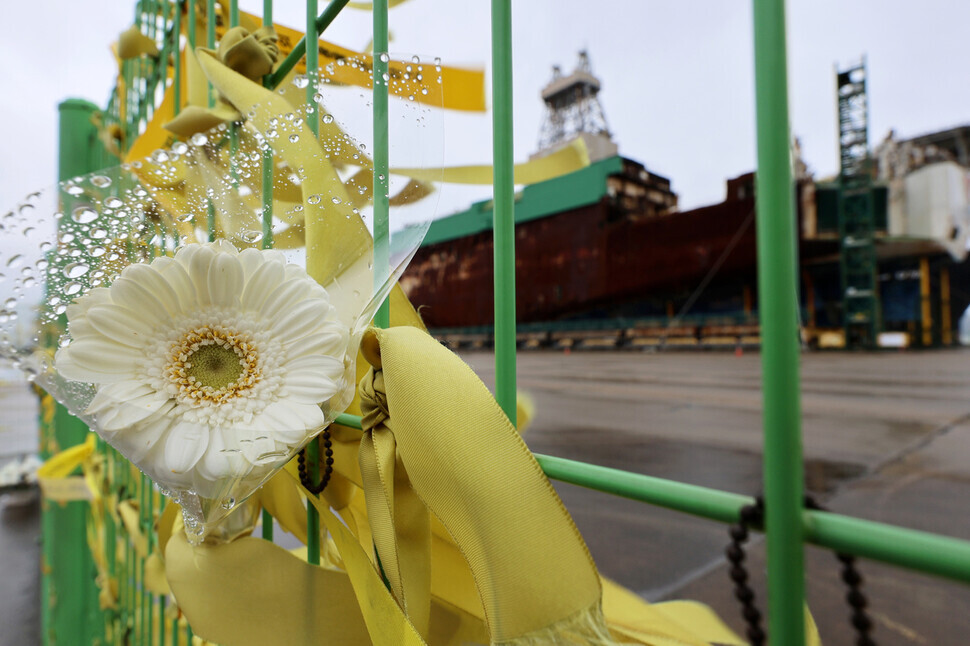hankyoreh
Links to other country sites 다른 나라 사이트 링크
[Editorial] 10 years on, lessons of Sewol tragedy must never be forgotten

The 10th anniversary of the Sewol ferry’s sinking has brought streams of visitors to commemorative sites, including the harbor at Paengmok in Jindo and the memorial classroom at Danwon High School in Ansan, which many of the victims attended.
The visits are a gesture of solidarity and commitment by survivors and victims’ surviving family members, as well as members of the public who have pledged never to forget the lessons imparted by the disaster. The Sewol tragedy, in which hundreds — mostly high school students on a class trip — died, exposed shameful aspects of a South Korean society that puts profits ahead of safety.
But while the public regards the disaster as an occasion for reflection and remorse, the government seems to hope the Sewol will be swiftly forgotten.
The 4/16 Network, a civic group dedicated to remembrance and action, said Monday that of the 54 measures recommended by the Special Investigation Commission on Social Disasters when it concluded its activities in June 2022, the South Korean government had implemented just one, concerning improvements to the marine disaster search and rescue system.
The commission recommended that the president personally apologize for the National Intelligence Service (NIS) illegally monitoring family members of the tragedy’s victims and for obstructions of investigations into the sinking. The presidential office refused to do so.
Other recommendations by the commission that have been ignored include an additional independent probe into the illegal monitoring and investigation obstruction; the transfer of related NIS documents to the National Archives of Korea; and revision of the payment period for health care support funds.
This is not all. In 2019, the government and family members of the victims reached an agreement on the establishment of an official memorial site at Hwarang Park across from Danwon High School. Thanks to the administration putting off the process for various and sundry reasons, the 10th anniversary has arrived without so much as a groundbreaking.
When the US federal government built a memorial park for the 9/11 terror attacks in the heart of New York, it was an expression of the commitment to remembering so that such tragedies would never be repeated. The South Korean government seems to be afraid of the public remembering the Sewol tragedy at all.
Ten years may have passed since the sinking, but safety conditions in South Korea have shown little in the way of improvement. Last year, no fewer than 598 workers died in workplace accidents. The number of suicides well exceeded 10,000.
The crowd crush that claimed 159 lives in Seoul’s Itaewon neighborhood on Oct. 29, 2022, was like the Sewol tragedy’s history repeating itself. Rather than investigating things thoroughly, punishing those responsible, and establishing countermeasures, the administration focused its energies on evading responsibility and keeping the investigation from going too far.
Having such a government in place only leaves the public feeling more uneasy. A survey of disaster survey perceptions recently administered by the Dong-A University Emergency Response Technology Policy Research Center to coincide with the Sewol tragedy’s 10th anniversary showed 60% of respondents answering that South Korea was “not safe.”
They also said they felt that responsibility for safety lay with the central government (34%) and president (41.4%). Yet the administration seems to be focusing on everything but the public’s security.
A society that does not remember its disasters can never be a safe society.
Please direct questions or comments to [english@hani.co.kr]

Editorial・opinion
![[Column] Season 2 of special prosecutor probe may be coming to Korea soon [Column] Season 2 of special prosecutor probe may be coming to Korea soon](https://flexible.img.hani.co.kr/flexible/normal/500/300/imgdb/original/2024/0426/3317141030699447.jpg) [Column] Season 2 of special prosecutor probe may be coming to Korea soon
[Column] Season 2 of special prosecutor probe may be coming to Korea soon![[Column] Park Geun-hye déjà vu in Yoon Suk-yeol [Column] Park Geun-hye déjà vu in Yoon Suk-yeol](https://flexible.img.hani.co.kr/flexible/normal/500/300/imgdb/original/2024/0424/651713945113788.jpg) [Column] Park Geun-hye déjà vu in Yoon Suk-yeol
[Column] Park Geun-hye déjà vu in Yoon Suk-yeol- [Editorial] New weight of N. Korea’s nuclear threats makes dialogue all the more urgent
- [Guest essay] The real reason Korea’s new right wants to dub Rhee a founding father
- [Column] ‘Choson’: Is it time we start referring to N. Korea in its own terms?
- [Editorial] Japan’s rewriting of history with Korea has gone too far
- [Column] The president’s questionable capacity for dialogue
- [Column] Are chaebol firms just pizza pies for families to divvy up as they please?
- [Column] Has Korea, too, crossed the Rubicon on China?
- [Correspondent’s column] In Japan’s alliance with US, echoes of its past alliances with UK
Most viewed articles
- 1‘We must say no’: Seoul defense chief on Korean, USFK involvement in hypothetical Taiwan crisis
- 2Why Kim Jong-un is scrapping the term ‘Day of the Sun’ and toning down fanfare for predecessors
- 3Two factors that’ll decide if Korea’s economy keeps on its upward trend
- 4BTS says it wants to continue to “speak out against anti-Asian hate”
- 5After election rout, Yoon’s left with 3 choices for dealing with the opposition
- 6Gangnam murderer says he killed “because women have always ignored me”
- 7South Korea officially an aged society just 17 years after becoming aging society
- 8Noting shared ‘values,’ Korea hints at passport-free travel with Japan
- 9Ethnic Koreans in Japan's Utoro village wait for Seoul's help
- 10US citizens send letter demanding punishment of LKP members who deny Gwangju Massacre